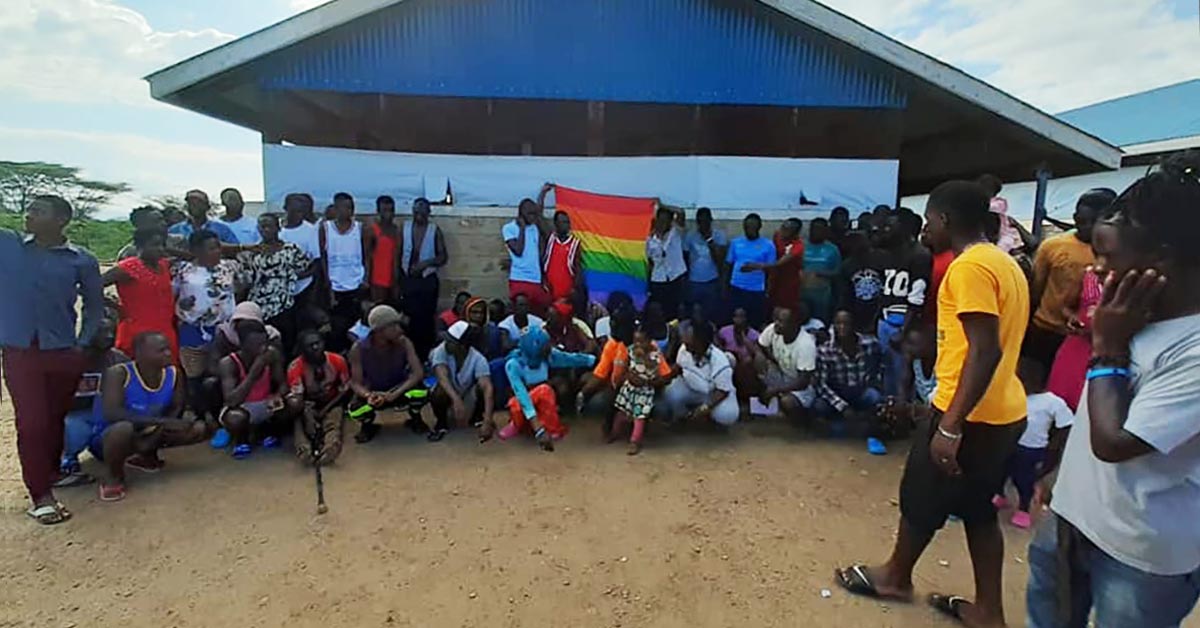Kenya’s Kakuma refugee camp still not safe for LGBTI refugees

LGBTI refugees and asylum seekers at Kakuma Camp (Photo: Facebook / Refugee Flag Kenya)
The Kakuma refugee camp in northwestern Kenya, home to over 200,000 asylum seekers and refugees, including a significant number of LGBTI individuals, continues to be plagued by homo- and transphobic discrimination, violence, and human rights abuses.
In a joint report, the National Gay and Lesbian Human Rights Commission (NGLHRC) and Amnesty International shed light on the dire situation faced by LGBTI residents in Kakuma, highlighting the need for immediate action to ensure their safety and well-being.
“LGBTI individuals in Kakuma camp have suffered physical and sexual violence and other serious human rights abuses, including violations of their right to be free from torture and ill-treatment, because of their sexual orientation, gender identity and/or expression, or sexual characteristics,” said Victor Nyamori, Amnesty International’s Researcher and Advisor on Refugee and Migrants Rights.
“Such hate crimes are a criminal manifestation of the discrimination LGBTI refugees and asylum seekers face,” added Nyamori.
Heartbreaking Testimonies
The report, based on interviews with 41 LGBTI asylum seekers and refugees between 2018 and February 2023, details how perpetrators of violence and intimidation towards LGBTI individuals commit their crimes with almost total impunity, enabled by inaction on the part of the authorities.
The report highlights the harrowing experiences shared by survivors in Kakuma.
Esther, a 41-year-old lesbian woman, was subjected to two brutal rape incidents. The first occurred in early 2018 when she was attacked by two knife-wielding men while showering near the camp gate. The second incident took place later that year during a burglary at her house, where she was raped by four men in front of her young son.
Winnie, another lesbian woman, owned a business in the market frequented by LGBTI individuals. One day, while she was away, her stall was destroyed, and her child was injured by a group of people who claimed that LGBTI customers were impacting other businesses. When she sought help from the police, they refused to take action unless she identified and apprehended the attackers herself.
Legal and Social Obstacles
Same-sex relations are illegal in 32 out of 54 African countries, often carrying severe penalties, including death or lengthy prison terms. In Kenya, laws originating from the colonial era still criminalise same-sex acts, punishable by up to 14 years in prison. These legal barriers perpetuate an environment of fear and prejudice, exacerbating the challenges faced by LGBTI individuals seeking refuge in Kakuma.
“Hate crimes have a pernicious and long-lasting impact on survivors and communities and require a coherent and thorough response from policy makers, law enforcement officials and the criminal justice system,” said Njeri Gateru, Executive Director of the National Gay and Lesbian Human Rights Commission (NGLHRC).
Organisations Call for Urgent Action
Amnesty International and NGLHRC assert that the Kakuma refugee camp complex is not a safe environment for LGBTI asylum seekers and refugees. They say that to transform Kenya’s encampment policy and make local integration a durable solution for LGBTI refugees, the Kenyan government, the United Nations High Commissioner for Refugees (UNHCR) and third country governments must act on the report’s recommendations.
The organisations have called on the Kenyan government to prioritise the physical and psychological safety of all LGBTI asylum seekers and refugees in Kakuma. Additionally, authorities should engage in discussions with affected individuals and the wider LGBTI community to devise measures that effectively prevent and respond to hate crimes and discrimination.
To ensure the provision of essential services, authorities must consider amending or suspending the encampment policy, allowing for the temporary or permanent relocation of LGBTI individuals to Nairobi or other urban areas.
NGLHRC and Amnesty International have also called on other countries to increase pledges for resettlement and establish or enhance flexible alternative pathways for LGBTI asylum seekers and refugees in Kenya who need safety in a third country but do not qualify for traditional resettlement or other pathways.
World’s First Refugee Camp LGBTI Pride
In June 2018, Kakuma LGBTI asylum seekers and refugees held what’s believed to be the world’s first LGBTI pride parade in a refugee camp. The event, however, was marred by violence and death threats from fellow refugees.
Matters continued to deteriorate, culminating in the 2021 death of human rights defender Chriton ‘Trinidad’ Atuhwera who died from burns sustained in a homophobic attack.
The 22-year-old spent weeks in a critical condition in an ill-equipped hospital for weeks after he was burned when a petrol bomb was thrown into a group of LGBTI refugees, allies and their children in Kakuma.
Both the local authorities and the UNHCR have for years been accused of failing to take action to stop the vulnerable LGBTI residents of the camp from becoming targets of violence and abuse.
Leave a Reply